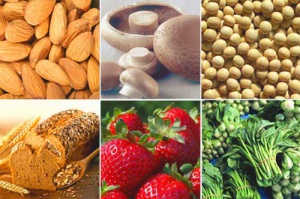Vitamin B2
Contents
Description
Discovered in 1920 after much research was done on pellagra finally brought it to scientific attention, Vitamin B2, also known as riboflavin, is a micronutrient that is simply absorbed and plays an important part in maintaining the health in humans and animals. The central piece of cofactors FAD and FMN, vitamin B2 is needed by all flavoproteins and required for a large number of cellular processes. Vitamin B2 plays an influential role in metabolizing energy, fats, ketone bodies, proteins and carbohydrates. Although available in a variety of food sources, vitamin B2 may also be taken in supplements if desired. Exposure to sunlight destroys riboflavin.
Health Benefits
A water soluble vitamin, riboflavin offers a wide variety of health benefits including the major role it plays in the metabolism of carbohydrates, fats and proteins which assist in the normal functioning of the body. Vitamin B2 is especially important in forming red blood cells and antibodies in humans which assists in the prevention of illness and fighting off existing ailments. Riboflavin plays an important role in the normal growth and development of reproductive organs and various body tissue including the skin, nervous system, defense system, mucous membranes, connective tissues and the eyes. This vitamin also ensure healthy and glowing hair, nails and skin growth and preservation. Vitamin B2 helps regulate thyroid functions for a normal thyroid and metabolism and prevents certain common ailments such as migraines, acne, dermatitis, cataracts, eczema and rheumatoid arthritis. Riboflavin enhances the natural immunity and assists with healing injuries, wounds and body tissue. Vitamin B2 also helps protect the nervous system against various conditions such as epilepsy, multiple sclerosis, anxiety and Alzheimer's Disease and can assist with slowing the progression of AIDS. Riboflavin assists in absorption of various minerals and vitamins such as vitamin B6 and folic acid and plays a very important role in fetus development during a woman’s pregnancy.
Beauty Benefits
Various beauty benefits are promised with normal levels of vitamin B2 including but not limited to: the healthy condition and growth of your hair, skin and nails aided by normal metabolic functions. Riboflavin helps prevent and cure acne conditions by controlling the mucus secretion in the skin and healing skin pustules. Riboflavin prevents and treats skin conditions such as rosacea and dermatitis while preventing and treating hair loss and ensuring strong nails and healthy vision. An important antioxidant, this vitamin helps fight off free radical damage in the body and ensures healthy vision.
Deficiency
Deficiency in riboflavin can greatly harm and, in some cases, prevent the complete metabolic functions of proteins, fats and carbohydrates. Signs of a vitamin B2 deficiency include bloodshot eyes, parched lips, oily & dull hair, premature wrinkles, split nails, sore tongue and high sensitivity to light. This deficiency may result in the abnormal functioning of the adrenal glands which could result in anemia, chronic fatigue syndrome and cataracts.
Food Sources
- Almonds
- Mushrooms
- Whole Grain
- Soybeans
- Green Leafy Vegetables
- Milk
- Cheese
- Strawberries
- Raspberries
- Low Fat Yogurt
- Broccoli
- Cauliflower
- Oily Fish
- Flour
- Cereals
Foods containing riboflavin should not be stored in clear containers that are exposed the light as exposure to light destroys this vitamin.
- Infants: 0-6 Months 0.3 Mg/7-12 Month 0.4 Mg
- Children: 1-3 Years 0.6 Mg/ 4-8 Years 0.7 Mg
- Males: 9-13 Years 0.8 Mg/ 14-18 Years 0.9 Mg/ 19-70 Years 1.3 Mg
- Females: 9-13 Years 0.7 Mg/ 14-18 Years 0.8 Mg/ 19-70 Years 1.1 Mg
- Pregnant Females: 19-50 Years 1.4 Mg
- Breast Feeding Females: 19-50 Years 1.6 Mg
